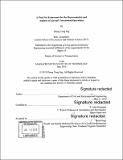A Petri Net framework for the representation and analysis of aircraft turnaround operations
Author(s)
Sng, Zheng Yang.
Download1129597567-MIT.pdf (41.79Mb)
Other Contributors
Massachusetts Institute of Technology. Department of Civil and Environmental Engineering.
Advisor
R. John Hansman.
Terms of use
Metadata
Show full item recordAbstract
Aircraft turnaround operations is a key determinant of both airline and airport performance. Airlines incur both direct and indirect costs from poor on-time departure performance, particularly when these delays propagate through an airline's schedule and additional resources have to be utilized for schedule recovery. As for airports, poor stand utilization due to excessive stand occupancy times can give rise to stand shortages and last-minute reallocations which disrupt operations across both terminal and airside. As such, optimization of aircraft turnaround operations provides opportunities for improvements at a systemic level. Petri Nets were chosen as the modelling tool as they possess features which can sufficiently account for both the complexity and uncertainty associated with aircraft turnarounds. Petri Nets models were first constructed to provide general representations for the turnaround operations of narrow-bodied B738 and wide-bodied A333 aircrafts. The Petri Nets were then adapted to make provisions for operational procedures specific to Changi Airport Singapore, the case study for this paper. The rationale for this 2-step process is to facilitate reusability of the proposed framework as the Petri Nets can be adapted to fit different contexts. After the Petri Nets were calibrated using empirical data, Monte Carlo simulations were performed. Critical path analysis was then conducted for characterization of existing operations. For B738, critical paths involving passenger services and fueling-related activities dominated. For A333, critical paths involving passenger services as well as fueling-related and catering-related activities dominated. Different modifications were then added to the Petri Nets and subsequently evaluated for their potential to reduce stand occupancy times through additional rounds of simulation. Different combinations of modifications involving automated aerobridge operations and removal of passenger deboarding as a precedent constraint for fueling-related and catering-related activities achieved noticeable reductions in stand occupancy times for B738 and A333. The potential reductions in stand occupancy times from improved scheduling outcomes were also analyzed.
Description
Thesis: S.M. in Transportation, Massachusetts Institute of Technology, Department of Civil and Environmental Engineering, 2019 Cataloged from PDF version of thesis. Includes bibliographical references (pages 124-125).
Date issued
2019Department
Massachusetts Institute of Technology. Department of Civil and Environmental EngineeringPublisher
Massachusetts Institute of Technology
Keywords
Civil and Environmental Engineering.